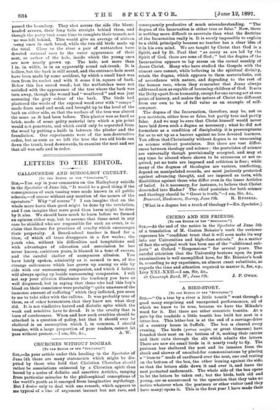CHURCHES WITHOUT DOGMAS.
[To THE EDITOR 01 THE "SrEcreTon."] Sin,—In year article under this heading in the Spectator of June 5th there are many statements which might be dis- puted by those who hold that Christian Churches should rather be associations animated by a Christian spirit than bound by a series of definite and assertive Articles, ranging from particular miracles to the philosophical conceptions of the world's youth as it emerged from imaginative mythology. But I desire only to deal with one remark, which appears to me typical of a line of argument inexact but not rare, and
consequently productive of much misunderstanding. "The dogma of the Incarnation is either true or false." Now, there is nothing more difficult to ascertain than what the doctrine of the Incarnation really is. It is surely impossible to explain to a child, principally because no teacher has a clear idea of it in his own mind. We are taught by Christ that God is a Spirit, and by St. Paul that "as many as are led by the Spirit of God, these are sons of God ; " but the dogma of the Incarnation appears to lay stress on the carnal sonship of Jesus Christ. Many who have studied the Gospels with the- utmost care cannot, while believing in the spiritual divinity, retain the dogma, which appears to them materialistic, out of accordance with nature, and degrading to the rest of the human race, whom they remember that Jesus always addressed men as capable of becoming children of God. It sets the Deity apart from humanity, except for one saving act at one point of history, and makes the nature of Christ too different from our own to be of full value as an example of self- conquest.
The dogma of the Incarnation, therefore, may be, not as. you maintain, either true or false, but partly true and partly false. And we may be sure that Christ himself would never have laid down such a dogma as necessary ; what he did not formulate as a condition of discipleship it is presumptuous. for us to set up as a barrier against no less devoted learners. You affirm that Christianity without dogma is as unmeaning as science without postulates. But there are vast differ- ences between theology and science : the postulates of science are universally though provisionally accepted, and may at any time be altered where shown to be erroneous or not re- quired, yet no tests are imposed and criticism is free; while many of the dogmas of theologies are various, conflicting,. depend on manipulated records, are most jealously protected against advancing thought, and are imposed as tests, with' disabilities against those who differ even in the lesser Articles. of belief. Is it necessary, for instance, to believe that Christ descended into Hades ? The chief postulate for both science- and theology should be "Great is truth."—I am, Sir, &c.,
Dunrozel, Haslemere, Surrey, June 7th. R. RUSSELL.
[What is a dogma but a truth of theology P—En. Spectator.}


































 Previous page
Previous page